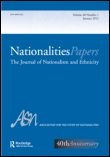
Nationalities Papers-The Journal of Nationalism and Ethnicity
Scope & Guideline
Illuminating the Pathways of Ethnic Studies and National Identity
Introduction
Aims and Scopes
- Nationalism Studies:
The journal focuses on the study of nationalism, exploring its historical development, theoretical frameworks, and contemporary manifestations across various regions. - Ethnic Identity and Politics:
It examines the dynamics of ethnic identities, their formation, and their role in political processes, including electoral politics and governance. - Transnational and Diaspora Studies:
The journal addresses the experiences and identities of diaspora communities, analyzing their impact on national narratives and transnational connections. - Conflict and Memory Politics:
It delves into the relationship between nationalism and conflict, including the politics of memory and how historical narratives shape contemporary identities. - Legal and Institutional Frameworks:
The journal investigates how legal and institutional frameworks affect the rights and status of ethnic minorities and the implications for state-minority relations. - Cultural Representations of Nationalism:
It includes research on how nationalism is represented in various cultural forms, including art, literature, and media, contributing to the construction of national identities.
Trending and Emerging
- Populism and Nationalism:
There is an increasing focus on the relationship between populism and nationalism, particularly how populist movements reshape national identities and political discourse. - Migration and National Identity:
Recent studies emphasize the impact of migration on national identity and the challenges posed by multiculturalism, reflecting global migration trends. - Digital Nationalism:
Explorations of nationalism in digital spaces, including social media and online communities, are gaining traction, highlighting how technology influences national narratives. - Environmental Nationalism:
Emerging research addresses the intersection of nationalism with environmental issues, examining how national identities are constructed around ecological concerns. - Gender and Nationalism:
There is a growing interest in the interplay between gender and nationalism, exploring how gender dynamics shape and are shaped by nationalist movements. - Health and Nationalism in the Context of COVID-19:
The pandemic has prompted new inquiries into how nationalism influences public health responses and the framing of health crises in national discourse.
Declining or Waning
- Colonial and Post-Colonial Nationalism:
Research related to colonial and post-colonial nationalism has decreased, possibly reflecting a shift towards more contemporary issues of nationalism in a globalized context. - Static Historical Narratives:
There has been a waning interest in purely historical narratives of nationalism without contemporary relevance, as scholars increasingly seek to connect past events to present-day issues. - Exclusive Nationalism:
Themes exploring exclusive forms of nationalism that negate pluralism and multiculturalism are less frequently addressed, possibly due to a growing emphasis on inclusive national identities. - Theoretical Overviews:
The journal has seen a reduction in publications focused solely on theoretical overviews of nationalism, favoring empirical research that provides actionable insights.
Similar Journals
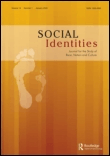
Social Identities
Fostering Critical Discourse on Identity RepresentationSocial Identities is a distinguished academic journal published by Routledge Journals, Taylor & Francis Ltd, dedicated to advancing the understanding of social identities from a multidisciplinary perspective. With an ISSN of 1350-4630 and an E-ISSN of 1363-0296, this journal stands out in the sociology and political science disciplines, as evidenced by its impressive Q2 ranking and a Scopus percentile of 64th. Spanning from 1995 to 2024, it continually fosters scholarly discourse on the complexities of identity formation, representation, and the interplay between various social dynamics. Although the journal currently does not offer Open Access options, it remains a valuable resource for researchers and professionals seeking in-depth analysis and critical insights. Based in the United Kingdom, Social Identities is a vital platform for both emerging scholars and established experts dedicated to exploring the nuances of how identities shape social structures and experiences.

MODERN ASIAN STUDIES
Unveiling the Depths of Modern Asian CulturesModern Asian Studies, published by Cambridge University Press, is a highly esteemed journal that encompasses scholarly research focused on the vibrant and complex narratives of Asian societies, cultures, and histories. With an ISSN of 0026-749X and an E-ISSN of 1469-8099, this journal has been at the forefront of Asian studies since its inception in 1967 and continues to evolve, striving towards excellence with a convergence period extending to 2024. It holds a prestigious Q1 ranking in History and Q2 rankings in both Geography, Planning, and Development as well as Sociology and Political Science as of 2023. With Scopus rankings placing it in the top 92nd percentile in History and maintaining significant standing in other social sciences categories, Modern Asian Studies provides invaluable insights for researchers, professionals, and students alike. Although not an open-access journal, it remains committed to disseminating impactful research that addresses critical issues within Asian studies, enhancing the academic discourse and contributing to a deeper understanding of the region's past and present.
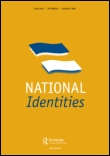
NATIONAL IDENTITIES
Defining Tomorrow's Identities TodayNATIONAL IDENTITIES, published by Routledge Journals, Taylor & Francis Ltd, serves as a vital platform for scholarly discourse on the multifaceted concept of national identity. With its ISSN 1460-8944 and E-ISSN 1469-9907, this journal explores the intricate intersections of history, culture, and politics, contributing significantly to the field of humanities. Its impressive performance is underscored by its categorization in Q1 for history and notable rankings in Arts and Humanities, placing it in the 93rd percentile amongst peer publications. While the journal does not currently offer open access, its comprehensive research output from 2003 to 2024 positions it at the forefront of academic inquiry into national identity issues and their implications in contemporary society. Aimed at researchers, professionals, and students alike, NATIONAL IDENTITIES is indispensable for those seeking to understand the evolving nature of identity in a globalized world.
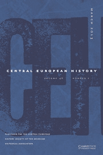
CENTRAL EUROPEAN HISTORY
Connecting Past and Present in Central European HistoriographyCENTRAL EUROPEAN HISTORY is a distinguished academic journal published by Cambridge University Press, dedicated to the exploration and analysis of historical developments in Central Europe. With its ISSN 0008-9389 and E-ISSN 1569-1616, this journal has been a cornerstone in historical scholarship since its inception in 1968, catering to a global audience through its rigorous research articles and interdisciplinary approach. Recognized in the Q2 category in History in 2023, it aims to bridge gaps in Central European historiography and foster a deeper understanding of the region's complex past. The journal's commitment to publishing high-quality research makes it an invaluable resource for historians, researchers, and students alike. Although it does not offer Open Access, CENTRAL EUROPEAN HISTORY remains a vital publication in the field, addressing themes and debates that resonate with contemporary academic discourses. With a rich archive spanning over five decades, it continues to influence scholarship and promote informed discussions around Central European historical narratives.
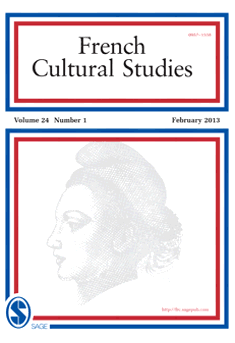
French Cultural Studies
Unraveling the Rich Tapestry of French Cultural HeritageFrench Cultural Studies, published by SAGE Publications Inc, is a leading journal in the domains of Cultural Studies and History. With its ISSN 0957-1558 and E-ISSN 1740-2352, this esteemed journal has made significant contributions to the understanding of French culture, literature, and society since its inception in 1990. Notably ranked in the Q2 category for Cultural Studies and Q1 category for History in 2023, it stands out with impressive Scopus rankings, placing 447th in History and 482nd in Cultural Studies. The journal aims to facilitate a nuanced discourse around French cultural phenomena, offering researchers, professionals, and students a platform for high-quality scholarly work. Although it does not operate under an Open Access model, its rigorous peer-review process ensures the publication of impactful articles that advance academic inquiry and foster collaborative dialogue in the field. Adhering to the mission of promoting interdisciplinary research, French Cultural Studies is a vital resource for anyone interested in exploring the complexities of French cultural identity and its global implications.

Sport in History
Advancing Scholarly Discourse on Sport's Historical Significance.Sport in History is a distinguished academic journal published by Routledge Journals, Taylor & Francis Ltd, dedicated to exploring the multifaceted intersections of sport and historical narratives. Since its inception in 2003, the journal has served as a vital platform for researchers and educators alike, facilitating scholarly discourse in history while maintaining its position in the top quartile (Q1) within the History category, as reflected by its impressive Scopus ranking. Although it does not operate under an open access model, Sport in History remains crucial for professionals and students engaged in the study of cultural histories shaped by sports. The journal aims to publish high-quality, peer-reviewed articles that illuminate the historical significance of various sports practices and policies, fostering a deeper understanding of their impact on society. Recognized for its commitment to academic excellence, Sport in History continues to enrich its field and inspire the next generation of historians and sport scholars.

Studia Slavica et Balcanica Petropolitana
Advancing Interdisciplinary Insights into Slavic and Balkan StudiesStudia Slavica et Balcanica Petropolitana is an esteemed open-access journal, published by the Department of History at St. Petersburg State University, focusing on interdisciplinary research within the fields of Slavic and Balkan studies. Since its inception in 2007, the journal has made significant contributions to the academic discourse surrounding historical and contemporary issues pertinent to these regions, thus achieving a strong reputation among scholars. As of 2023, it is categorized in the Q2 quartile for History, ranked 873 out of 1760 in the arts and humanities segment, highlighting its impactful scholarly contributions. The journal operates out of Russia, with its editorial office located at Mendeleevskaya Liniya in St. Petersburg. Its accessible publishing model promotes widespread dissemination of knowledge, making it an invaluable resource for researchers, professionals, and students who aim to deepen their understanding of Slavic and Balkan societies from both historical and modern perspectives.
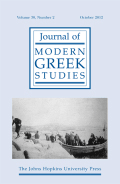
JOURNAL OF MODERN GREEK STUDIES
Engaging with the Pulse of Contemporary Greek StudiesJOURNAL OF MODERN GREEK STUDIES, published by Johns Hopkins University Press, is an esteemed academic journal dedicated to the exploration and analysis of contemporary Greek culture, history, and society. With its ISSN 0738-1727 and E-ISSN 1086-3265, this journal significantly contributes to the fields of Cultural Studies, History, Sociology, and Political Science, consistently ranking within the upper quartiles in 2023. As a vital resource for researchers, professionals, and students, the journal provides a platform for interdisciplinary scholarship and critical discourse, enhancing our understanding of modern Greece from various perspectives. Readers can access a range of scholarly articles and reviews that delve into the complexities of Greek identity and its historical narratives. With converged years from 2002 to 2024, the JOURNAL OF MODERN GREEK STUDIES remains a pivotal reference point for those interested in Greek studies, underlining its importance and relevance within both national and international academic circles.
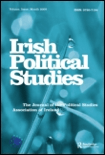
Irish Political Studies
Bridging Research and Real-World Political InsightsIrish Political Studies, published by Routledge Journals, a prestigious entity under Taylor & Francis Ltd, is a leading journal in the field of political science and sociology with a notable impact factor that exemplifies its academic significance. Established in 1986, this journal has built a strong reputation for publishing high-quality, peer-reviewed research that addresses contemporary issues in Irish politics, as well as broader themes in international relations and political sociology. The journal is categorized in the Q2 quartile for both Political Science and Sociology, signifying its high influence among academic publications, and ranks 213 out of 706 in Political Science on Scopus. Although not designated as an Open Access journal, it remains a vital resource for researchers and practitioners seeking to deepen their understanding of the dynamic political landscape in Ireland and beyond. With an editorial commitment to inclusivity and interdisciplinary approaches, Irish Political Studies continues to engage academics, professionals, and students, fostering insightful discussions that shape the future of political scholarship.

Contemporary Southeast Asia
Engaging with the Contemporary Issues of Southeast AsiaContemporary Southeast Asia is a leading academic journal published by the Institute of Southeast Asian Studies (ISEAS), Singapore, offering insightful analyses and discussions on the dynamic socio-political landscape of Southeast Asia. With an ISSN of 0129-797X and an E-ISSN of 1793-284X, this journal has been a significant contributor to the fields of Development, History, Political Science, and Sociology since its inception in 1979, and it continues to shape discourse through its robust publication record extending into 2024. The journal holds prestigious rankings, including Q2 in Development and Political Science, Q1 in History, and Q2 in Sociology, reflecting its rigorous scholarship and impact in the academic community. Researchers, professionals, and students will find valuable resources within its articles that address critical issues pertinent to the region, fostering a deeper understanding of Southeast Asia’s role in global contexts. Although the journal currently does not provide Open Access options, its contributions remain invaluable to those engaged in the study of this vibrant and diverse area.